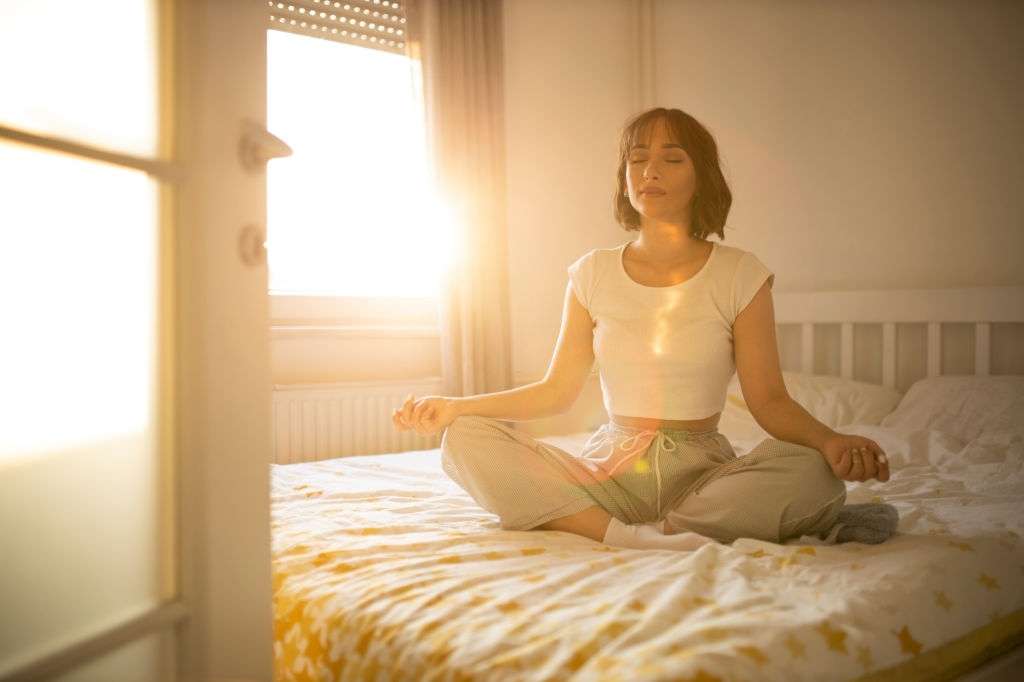How To Practice Meditation (Easy Guide)

Meditation has long been a popular way to improve your life through physical effects and mental rewards. However, it can sometimes be challenging to know where to begin. Often, some common excuses may keep you from starting, but really, those are just misconceptions: Meditation is never something we enjoy do not like doing. The actual benefits of meditation are in the process and not the result. Here are some types of meditation for beginners.
Breathing meditation is when you concentrate on your breath while watching your breath. You are paying attention to the sensations that your breathing creates. When you are deep in a meditation session, sometimes it is hard to be aware of your body’s trends. During this time, you may become aware of any unusual sensations or changes in the feelings that your body experiences. This is the focus and point of meditation.
Another type of meditation is mindfulness meditation, which is just the same as being mindful, or more specifically, becoming aware of your body. Mindfulness meditation is similar to breathing meditation, but you are more focused on your breath. The goal here is to focus all your mental energy, thoughts, emotions, and sensations on your breathing. This allows you to calm down. At first, this can feel quite uncomfortable because you are not fully aware of your body and its reactions to stimuli.
Metta meditation involves repeating a mantra over to yourself while you relax. The mantra can be a simple word or even a short line of a poem. Practicing metta requires that you repeat the mantra without judgment or thinking about anything in particular. Repeating the mantra helps to focus your mind on what is taking place at the moment.
Guided Imagery is a form of meditation that involves you visualize a peaceful scene that inspires you to pay close attention to your surroundings. There are many different types of guided Imagery, but the most common is when you are meditating on the breath. Using your imagination to create a calm and peaceful setting in your mind enables you to calm down and enter into a present moment.
There are also types of meditation that do not involve any action or physical movement. You can sit comfortably and relax and let the waves of your mind drift away. Other types of meditation help you focus your attention on an object by repeatedly focusing on it. For instance, you might spend five minutes looking at a potted plant. Whatever you focus on will eventually become apparent, and you will move your attention to the object. This type of meditation is sometimes called mindfulness meditation, as it calms your mind.
Mindfulness meditation can be practiced by individuals of all ages and can benefit those who feel that they have gotten themselves under a great deal of stress lately. The benefits of practicing it may not be immediately apparent; however, over time, you may find that the quality of your life has significantly improved. Some individuals even report feeling less depressed after some brief periods of mindfully meditating.
If you feel that you need to learn how to meditate more effectively, there are many resources available for you to use. Although it may take some effort and practice, your life could be transformed. Regardless of what technique you choose, if done with an awareness of the importance of perspective, you can begin to realize that amid so many things going on in your life, you can remain centered and focused on the present. You may want to consider seeking out a resource guide or book that can show you the proper way to meditate and allow you to see how simple it can be to maintain a sense of mental and physical balance.
How To Meditate With A Intimacy Disorder
For centuries meditation has been practiced all over the world. There are many types of meditation, such as Buddhist meditation, Guided Meditation, and Yoga meditation. In the United States and Europe, there are many meditation centers and organizations that offer guided meditation classes. These types of meditation have helped countless people find the peace and inner wisdom that they have sought for years. Even though meditation has a reputation for being a difficult task, it is not.
Meditation can be used to:
- Reduce stress.
- Boost energy.
- Improve alertness and concentration.
- Reduce anxiety, control anger and anxiety.
- Improve the clarity of thought.
- Control appetite.
- Treat addiction and much more.
If you are new to meditation or have difficulty controlling your emotions, guided meditation may be proper for you. Many individuals, children, and adults alike find meditation relaxing and enjoyable. Many doctors recommend meditation, and it is often suggested to those who are having problems with anxiety, stress, depression, addictions, and other issues. However, it is essential to remember that meditation alone is not the cure-all people claim it to be. It should only be a part of a more extensive regimen of healthy living.
Guided meditation is when you talk with someone else or listen to pre-recorded sounds that encourage you to focus on a specific object while staying within the mind. Reading music, watching a video, or listening to instrumental music helps many people meditate. You don’t have to have a lot of equipment, and you can use whatever resources are available. Most of the tools that you will need are very inexpensive. Guided meditation has helped many people to improve their self-esteem, physical health, well-being, and even to live a fuller life.
A well-balanced diet and exercise program, sufficient sleep and rest, and avoiding smoking and alcohol are essential factors in maintaining good health and active spiritual life. When you are meditating, you should pay attention to your breath instead of to objects around you. When you are in a meditative state, your focus drifts away from your body. If you are meditating on your stomach, you might feel uncomfortable and want to pull your belly button away from your spine. However, if you continue to focus on your breath, you will soon find yourself falling into a relaxed state of awareness.
Yoga and other physical exercises can help you realize the true nature of your body and the mind, which meditation does not. It is possible to meditate, but you must also move your body as you do so. The purpose of meditation is not to sit still but to stay alert and aware.
This allows you to explore the greater truth of your life and your connection to all of existence. Your meditation experiences will tell you things about yourself, your connection to the universe, and your place in the cosmos. These lessons can be a great source of insight.
Meditation does not have to take place in a religious setting or with an instructor. Some people find meditation and spiritual practice beneficial even without any structured spiritual practice. You might want to try it out to see how it feels. In any case, you need to work to make sure that your meditation experiences are positive and do not cause you to experience any adverse substance use. Some common substances that can cause negative experiences during meditation include caffeine, tobacco, alcohol, and drugs.
As mentioned, spiritual awareness is the primary objective of meditation. For many people who practice meditation, guided imagery can provide them with a creative means of enjoying the process of reflection. There are lots of kinds of guided imagery, such as yoga meditation, which teaches you to concentrate your breathing on your palms or to picture a mantra (a word you will replicate through your meditation practice), and audio meditation, which utilizes sounds of particular frequencies to calm your nerves and also prepare you to get more profound heights of spiritual consciousness. Another type of guided imagery that some people use during meditation is gardening, as it allows them to meditate with love and compassion.
Meditations are an excellent way to achieve inner peace, physical well-being, and spiritual growth. If you think you may have a problem with meditation, don’t hesitate to seek help from a friend or spiritual teacher. The important thing is to remember that the most important person is yourself when it comes to meditation. With some careful meditation practice, you can overcome any intimacy disorder and work on becoming more whole.
How long should beginners meditate?
How long should beginners take to meditate regularly? These are the questions that many people ask when they are just starting with meditating. There is no specific answer to this question. The only guideline we have on how to meditate is that the longer you meditate, the more relaxed you will be.
If you can spend ten minutes in meditation every day, you will find yourself more relaxed than meditating for three or four hours per day. Of course, this comes with both short-term and long-term benefits. In a short time, you will become calmer and focused as you become more accustomed to meditating. In a long time, you will experience all the incredible health benefits that meditation can give.
Can meditation make me forget things?
Meditation is about focusing your mind, so it is not going to forget things you need to do. However, the true power of meditation lies in the fact that it allows you to be in a state where you are not paying attention to everything around you. Your focus is purely on what you are doing at the present moment, which brings about a very peaceful, tranquil mind. The power of five minutes will certainly allow you to go into a more rested state, and it is not likely that you will lose concentration when you meditate for a couple of hours every day.
Is meditation for long-term relaxation?
Meditation is not meant to be a long-term solution for anxiety, depression, insomnia, or chronic fatigue syndrome. On the other hand, people who meditate for a few hours every day often find themselves feeling significantly more relaxed after their first meditation session than they did before starting. It is possible that even meditating for just ten minutes can improve your ability to deal with stress and anxiety.
People meditate for different reasons. Some do it because they want to learn new things or feel calmer. Others use daily meditation as a way to relax so that they can live a more peaceful life. Regardless of why you decide to meditate, doing it for a couple of minutes every day can benefit you.





